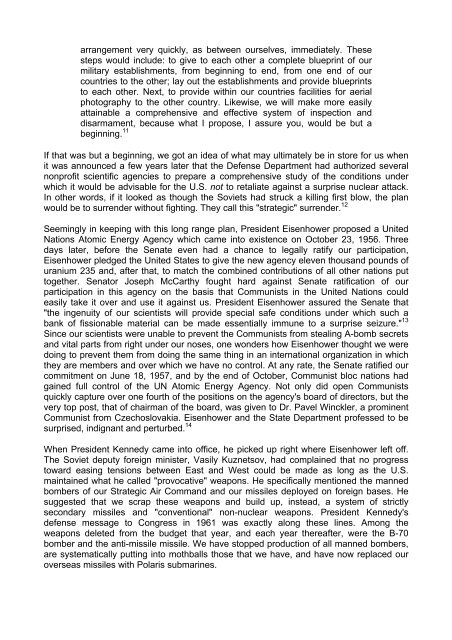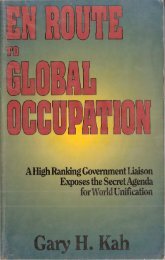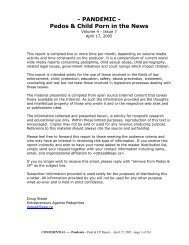G. Edward Griffin - The Fearful Master - PDF Archive
G. Edward Griffin - The Fearful Master - PDF Archive
G. Edward Griffin - The Fearful Master - PDF Archive
You also want an ePaper? Increase the reach of your titles
YUMPU automatically turns print PDFs into web optimized ePapers that Google loves.
arrangement very quickly, as between ourselves, immediately. <strong>The</strong>se<br />
steps would include: to give to each other a complete blueprint of our<br />
military establishments, from beginning to end, from one end of our<br />
countries to the other; lay out the establishments and provide blueprints<br />
to each other. Next, to provide within our countries facilities for aerial<br />
photography to the other country. Likewise, we will make more easily<br />
attainable a comprehensive and effective system of inspection and<br />
disarmament, because what I propose, I assure you, would be but a<br />
beginning. 11<br />
If that was but a beginning, we got an idea of what may ultimately be in store for us when<br />
it was announced a few years later that the Defense Department had authorized several<br />
nonprofit scientific agencies to prepare a comprehensive study of the conditions under<br />
which it would be advisable for the U.S. not to retaliate against a surprise nuclear attack.<br />
In other words, if it looked as though the Soviets had struck a killing first blow, the plan<br />
would be to surrender without fighting. <strong>The</strong>y call this "strategic" surrender. 12<br />
Seemingly in keeping with this long range plan, President Eisenhower proposed a United<br />
Nations Atomic Energy Agency which came into existence on October 23, 1956. Three<br />
days later, before the Senate even had a chance to legally ratify our participation,<br />
Eisenhower pledged the United States to give the new agency eleven thousand pounds of<br />
uranium 235 and, after that, to match the combined contributions of all other nations put<br />
together. Senator Joseph McCarthy fought hard against Senate ratification of our<br />
participation in this agency on the basis that Communists in the United Nations could<br />
easily take it over and use it against us. President Eisenhower assured the Senate that<br />
"the ingenuity of our scientists will provide special safe conditions under which such a<br />
bank of fissionable material can be made essentially immune to a surprise seizure." 13<br />
Since our scientists were unable to prevent the Communists from stealing A-bomb secrets<br />
and vital parts from right under our noses, one wonders how Eisenhower thought we were<br />
doing to prevent them from doing the same thing in an international organization in which<br />
they are members and over which we have no control. At any rate, the Senate ratified our<br />
commitment on June 18, 1957, and by the end of October, Communist bloc nations had<br />
gained full control of the UN Atomic Energy Agency. Not only did open Communists<br />
quickly capture over one fourth of the positions on the agency's board of directors, but the<br />
very top post, that of chairman of the board, was given to Dr. Pavel Winckler, a prominent<br />
Communist from Czechoslovakia. Eisenhower and the State Department professed to be<br />
surprised, indignant and perturbed. 14<br />
When President Kennedy came into office, he picked up right where Eisenhower left off.<br />
<strong>The</strong> Soviet deputy foreign minister, Vasily Kuznetsov, had complained that no progress<br />
toward easing tensions between East and West could be made as long as the U.S.<br />
maintained what he called "provocative" weapons. He specifically mentioned the manned<br />
bombers of our Strategic Air Command and our missiles deployed on foreign bases. He<br />
suggested that we scrap these weapons and build up, instead, a system of strictly<br />
secondary missiles and "conventional" non-nuclear weapons. President Kennedy's<br />
defense message to Congress in 1961 was exactly along these lines. Among the<br />
weapons deleted from the budget that year, and each year thereafter, were the B-70<br />
bomber and the anti-missile missile. We have stopped production of all manned bombers,<br />
are systematically putting into mothballs those that we have, and have now replaced our<br />
overseas missiles with Polaris submarines.



![Robert T McQuaid [rtmq@stn.net] Sent: Friday, October 29, 2004 12 ...](https://img.yumpu.com/51070071/1/190x245/robert-t-mcquaid-rtmqstnnet-sent-friday-october-29-2004-12-.jpg?quality=85)







